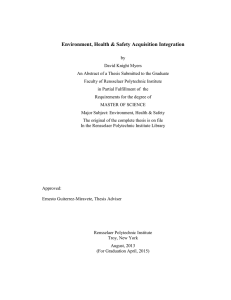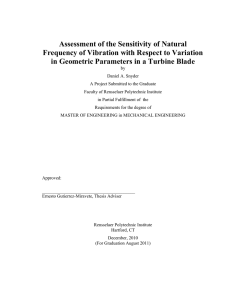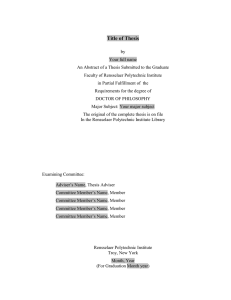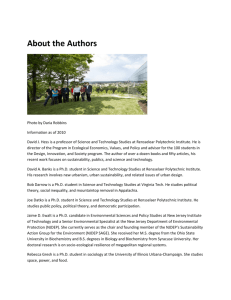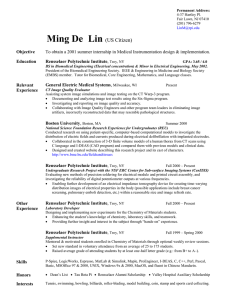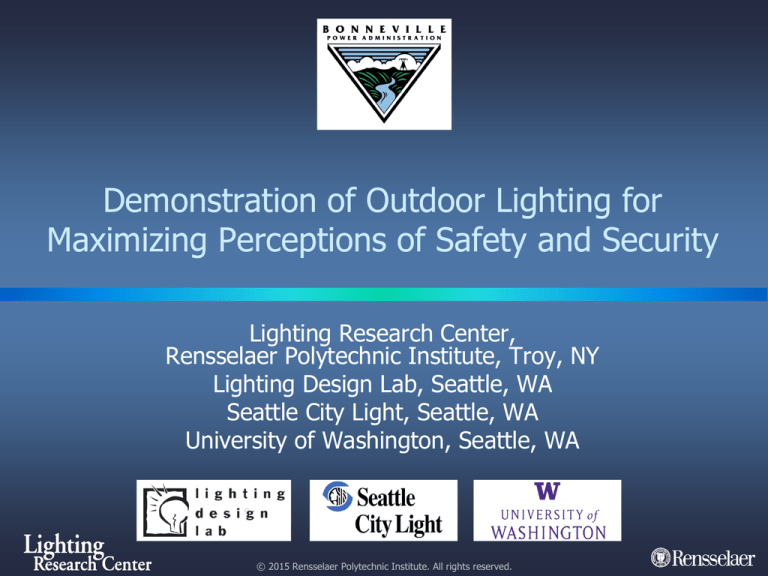
Demonstration of Outdoor Lighting for
Maximizing Perceptions of Safety and Security
Lighting Research Center,
Rensselaer Polytechnic Institute, Troy, NY
Lighting Design Lab, Seattle, WA
Seattle City Light, Seattle, WA
University of Washington, Seattle, WA
© 2015 Rensselaer Polytechnic Institute. All rights reserved.
Lighting Research Center (LRC) in its 28th year
Advancing the effective use of light,
thereby creating a positive legacy
for society and the environment.
30,000 sq. ft. near
Rensselaer campus
Troy, New York
NVLAP-accredited
testing laboratory
34 full-time faculty and staff
40-60 concurrent
projects in field
and lab
Research & education
revenue = $7 M/year
15 graduate students
2
© 2015 Rensselaer Polytechnic Institute. All rights reserved.
Some of our recent sponsors
Acuity Brands Lighting
Advance Transformer Co.
Aero Farm Systems LLC
Boeing
Bonneville Power Administration
Bridgelux
California Energy Commission
Center for General Aviation Research
Center of Excellence for Airport Technologies
City of Columbus, OH, Div. of Electricity
Connecticut Energy Efficiency Fund
Connecticut Light and Power Co.
Consolidated Edison
Cree
CSA, China
Culver-Amherst
Duke Lemur Center
Dynamic Hybrids
Efficiency Vermont
Everlight
Federal Aviation Administration
General Electric
General Motors
Gerry Foundation
Hella
Illuminating Engineering Society of North America
(IESNA)
Industrial Technology Research Institute (ITRI)
Institute for Human Centered Design (IHCD)
Iowa Energy Center
Kanzawa Institute of Technology
Lamar Lighting
LG Innotek
Lighting Science
LiteOn
Midwest Energy Efficiency Alliance
National Cancer Institute
National Center on Complementary and Alternative
Medicine
National Cooperative Highway Research Program
(NCHRP)
National Electrical Manufacturers Association (NEMA)
National Fire Protection Research Foundation (NFPA)
National Highway Traffic Safety Administration (NHTSA)
National Institute of Nursing Research
National Institute of Occupational Safety and Health
National Institute on Aging
National Institute on Drug Abuse
National Science Foundation
Natural Resources Canada
NeoPac
New Jersey Department of Transportation
New York City Dept. of Environmental Protection
New York State Dept. of Transportation
Nichia America Corp.
North Carolina Daylighting Consortium
Northwest Energy Efficiency Alliance
New York State Energy Research and Development
Authority (NYSERDA)
NYSTAR
Office of Naval Research
OSRAM Sylvania
Pacific Gas & Electric
Permlight
3
© 2015 Rensselaer Polytechnic Institute. All rights reserved.
Philips Lighting
Philips Respironics
Photonics Cluster (UK)/The Lighting Association
Price Chopper
RPC Photonics
R-Tech/Schréder
Sacramento Municipal Utility District
San Diego Gas & Electric
Seoul Semiconductor
Sharp
SolarOne Solutions
South Asia Regional Initiative for Energy (SARI/Energy)
Southern California Edison
Sri Lanka Sustainable Energy Authority (SLSEA)
Sullivan Renaissance
SunWize Technologies
Swedish Energy Agency
The Link Energy Foundation
The United Illuminating Company
Topbulb.com LLC
Tyler Refrigeration
U.S. Department of Energy
U.S. Environmental Protection Agency
U.S. Navy
Universal Lighting Technologies
University Transportation Research Center
USGBC
Visteon
WAC Lighting
Watt Stopper
Westinghouse Lighting
Wisconsin Energy Conservation Corp.
Background
Brightness as a benefit metric for
lighting
Rea M. 2013.
Value Metrics for Better Lighting.
SPIE Press Monograph PM228.
4
© 2015 Rensselaer Polytechnic Institute. All rights reserved.
Background
Brightness as a benefit metric for
lighting
Rea M. 2013.
Value Metrics for Better Lighting.
SPIE Press Monograph PM228.
5
© 2015 Rensselaer Polytechnic Institute. All rights reserved.
Brightness in illuminant mode
Often, we judge the lighting of a scene with respect to its
overall brightness
Both light level and light spectrum affect brightness
perception
Scene brightness affects our sense of safety and security
6
© 2015 Rensselaer Polytechnic Institute. All rights reserved.
Illuminant mode of viewing
B/L ratio of HPS (relative to MH)
0.8
B/L ratio
0.7
0.6
0.5
0.4
0.01
High Pressure Sodium
Metal Halide
HPS is 30% to 50% less
bright
0.1
1
2
MH luminance (cd/m )
Rea 1996
7
© 2015 Rensselaer Polytechnic Institute. All rights reserved.
Field demonstration: Austin, TX
HPS
Morante et al. 2007
FL
High
19 lx
11 lx
5 lx
3 lx
Low
8
© 2015 Rensselaer Polytechnic Institute. All rights reserved.
Morante et al. 2007
9
© 2015 Rensselaer Polytechnic Institute. All rights reserved.
Field test: High pressure sodium vs. metal halide
street lighting
Hypothesis: Higher
short-wavelength energy for
metal halide results in greater
perceived brightness
Sponsor: Philips Lighting
Rea et al. 2009
10
© 2015 Rensselaer Polytechnic Institute. All rights reserved.
Field test: High pressure sodium vs. metal halide
street lighting
Sponsor: Philips Lighting
n
HPS
(lx)
MH
(lx)
24
5-15
5-15
16
7-15
7-15
31
5-15
3-15
Rea et al. 2009
11
© 2015 Rensselaer Polytechnic Institute. All rights reserved.
Modeling brightness
14°
fixation point
1°
×
30° (not to scale)
The 3000 K, 14° adapting field had an initial luminance of 17,000 cd/m²
before extinction at time = 0 s. The small central field varied in wavelength
and luminance to determine the threshold of a 190-ms increment, either with
the adapting field in place or following extinction.
Wooten et al. 1975
12
© 2015 Rensselaer Polytechnic Institute. All rights reserved.
Modeling brightness
Increased short-wavelength sensitivity
Wooten et al. 1975
13
© 2015 Rensselaer Polytechnic Institute. All rights reserved.
Modeling brightness
VB(λ) = V(λ) + 0.5Mel(λ) + g2S(λ)
Wooten et al. 1975
14
© 2015 Rensselaer Polytechnic Institute. All rights reserved.
Field test: High pressure sodium vs. metal halide
street lighting
Hypothesis: Higher
short-wavelength energy for
metal halide results in greater
sense of safety and security
Sponsor: Philips Lighting
15
© 2015 Rensselaer Polytechnic Institute. All rights reserved.
What is the value of increased scene brightness
at night?
Locations that look
brighter also
feel safer
Correlation = 0.89
Rea et al. 2009
16
© 2015 Rensselaer Polytechnic Institute. All rights reserved.
Brightness prediction: Automobile forward lighting
Hamm 2011
17
© 2015 Rensselaer Polytechnic Institute. All rights reserved.
Brightness predictions: HPS vs. 6500 K LED
To be judged equally
bright, the LED illuminance
is predicted to be 54% of
the HPS illuminance
(Rea 2013).
18
© 2015 Rensselaer Polytechnic Institute. All rights reserved.
BPA project, December 2014
University of Washington, Seattle
Three campus parking lots
18 subjects
Team members
› LRC
•
•
•
•
Mark Rea
Jennifer Brons
Mariana Figueiro
John Bullough
› Seattle LDL
• Kurt Nielsen
• Jeff Robbins
• Eric Strandberg
› Seattle City Light
• Edward Smalley
19
© 2015 Rensselaer Polytechnic Institute. All rights reserved.
BPA project, December 2014
LED
Three parking lots evaluated
› Sound Transit Lot: Light-emitting
diode (LED) luminaires on 37’ poles
› W-35: High pressure sodium (HPS)
luminaires on 27’ poles
› W-12: Metal halide (MH) luminaires
on 27’ poles
MH
20
© 2015 Rensselaer Polytechnic Institute. All rights reserved.
HPS
Light level measurements
Brightness Illuminance (B2‐lx)
Photopic Illuminance (lx)
Source
Mean Median
Std. Dev.
Max.
Min.
Mean Median
Ratios
Std. Dev.
Max.
Min.
Max:Min
Avg:Min
LED
14.5
15.1
2.5
19.4
8.6
62.6
65.0
10.8
83.6
37.2
2.3
1.7
HPS
45.9
37.1
33.8
157.1
7.0
53.7
43.4
39.5
183.6
8.2
22.5
6.6
MH
5.6
4.6
3.4
14.0
1.6
25.6
21.1
15.6
63.7
7.3
8.7
3.5
21
© 2015 Rensselaer Polytechnic Institute. All rights reserved.
Comparison of photopic illuminance and brightness
illuminance
22
© 2015 Rensselaer Polytechnic Institute. All rights reserved.
Brightness judgments
23
© 2015 Rensselaer Polytechnic Institute. All rights reserved.
Safety judgments
24
© 2015 Rensselaer Polytechnic Institute. All rights reserved.
Adequate
Brightness illuminance for adequate
safety and security
66.8
25
© 2015 Rensselaer Polytechnic Institute. All rights reserved.
Design specifications
Brightness Illuminance
(B2‐lx)
Photopic Illuminance
(lx)
HPS
66.8
57.1
0.09
0.09
0.11
MH
66.8
14.7
0.14
0.03
0.05
LED
66.8
15.5
0.03
0.03
0.04
Light Source
Power Density: Power Density: Power Density: New After 5 Years Existing (W/ft2)
(W/ft2)
(W/ft2)
conversion table
26
© 2015 Rensselaer Polytechnic Institute. All rights reserved.
Design procedure
27
© 2015 Rensselaer Polytechnic Institute. All rights reserved.
Design procedure
28
© 2015 Rensselaer Polytechnic Institute. All rights reserved.
Design procedure
29
© 2015 Rensselaer Polytechnic Institute. All rights reserved.
Design specifications
Brightness Illuminance
(B2‐lx)
Photopic Illuminance
(lx)
HPS
66.8
57.1
0.09
0.09
0.11
MH
66.8
14.7
0.14
0.03
0.05
LED
66.8
15.5
0.03
0.03
0.04
Light Source
Power Density: Power Density: Power Density: New After 5 Years Existing (W/ft2)
(W/ft2)
(W/ft2)
= 0.07 W/ft²
30
© 2015 Rensselaer Polytechnic Institute. All rights reserved.
Cost
The amount of light needed to deliver an “adequate for safety” level of
light would be 66.8 B2-lx for any light source.
The incremental power density needed by the HPS lighting system over
the LED lighting system after 5 years, taking into account lumen
depreciation, is 0.07 W/ft².
The system cost to break even after 5 years is based upon the hours of
use as well as the incremental energy (power x time) costs of the HPS
relative to the LED systems to deliver 66.8 B2-lx at 5 years.
› Electricity would be used (12 h/day x 365 day/y) 21,900 h for 5 y.
› The incremental energy savings over 5 years is 1.5 kWh/ft².
At an estimated utility rate, including use and demand charges, of
$0.10/kWh, the energy cost savings over 5 years from the LED lighting
system would be $0.15/ft².
Example: 50,000 ft² parking lot
› For the 5 year payback, the initial cost of the LED system should not be more than
$7,500 over the HPS system.
© 2015 Rensselaer Polytechnic Institute. All rights reserved.
Expected benefits of brightness engineering
Adopting the design methodology would lead to
significant power and capital cost reductions in parking
lots relative to existing practice while providing
pedestrians with an “adequate for safety” level of light.
Relative to existing HPS technology, high CCT LEDs can
reduce energy consumption by approximately 50% in
parking lot applications. During the winter, peak
demand in the evening and the morning would also be
reduced.
Because these results have been shown empirically and
theoretically in previous published studies, the findings
from this demonstration project can be confidently and
immediately implemented.
32
© 2015 Rensselaer Polytechnic Institute. All rights reserved.
Thank you
• Bonneville Power Administration
• Seattle Lighting Design Lab
• Seattle City Light
• University of Washington
© 2015 Rensselaer Polytechnic Institute. All rights reserved.

